- Home
- G. K. Chesterton
The Complete Father Brown Mysteries Collection Page 54
The Complete Father Brown Mysteries Collection Read online
Page 54
‘Oh, I’ve no patience with all this sentimental whitewashing of worthless, murderous blackguards,’ cried Wain, heatedly. ‘If Wilton croaked the criminal he did a jolly good day’s work, and there’s an end of it.’
‘Quite so, quite so,’ said his uncle, nodding vigorously.
Father Brown’s face had a yet heavier gravity as he looked slowly round the semicircle of faces. ‘Is that really what you all think?’ he asked. Even as he did so he realized that he was an Englishman and an exile. He realized that he was among foreigners, even if he was among friends. Around that ring of foreigners ran a restless fire that was not native to his own breed; the fiercer spirit of the western nation that can rebel and lynch, and above all, combine. He knew that they had already combined.
‘Well,’ said Father Brown, with a sigh, ‘I am to understand, then, that you do definitely condone this unfortunate man’s crime, or act of private justice, or whatever you call it. In that case it will not hurt him if I tell you a little more about it.’
He rose suddenly to his feet; and though they saw no meaning in his movement, it seemed in some way to change or chill the very air in the room.
‘Wilton killed Doom in a rather curious way,’ he began.
‘How did Wilton kill him?’ asked Crake, abruptly.
‘With an arrow,’ said Father Brown.
Twilight was gathering in the long room, and daylight dwindling to a gleam from the great window in the inner room, where the great millionaire had died. Almost automatically the eyes of the group turned slowly towards it, but as yet there was no sound. Then the voice of Crake came cracked and high and senile in a sort of crowing gabble.
‘What you mean? What you mean? Brander Merton killed by an arrow. This crook killed by an arrow — ’
‘By the same arrow,’ said the priest, ‘and at the same moment.’
Again there was a sort of strangled and yet swollen and bursting silence, and young Wain began: ‘You mean — ’
‘I mean that your friend Merton was Daniel Doom,’ said Father Brown firmly;’ and the only Daniel Doom you’ll ever find. Your friend Merton was always crazy after that Coptic Cup that he used to worship like an idol every day; and in his wild youth he had really killed two men to get it, though I still think the deaths may have been in a sense accidents of the robbery. Anyhow, he had it; and that man Drage knew the story and was blackmailing him. But Wilton was after him for a very different purpose; I fancy he only discovered the truth when he’d got into this house. But anyhow, it was in this house, and in that room, that this hunt ended, and he slew the slayer of his father.’
For a long time nobody answered. Then old Crake could be heard drumming with his fingers on the table and muttering:
‘Brander must have been mad. He must have been mad.’
‘But, good Lord!’ burst out Peter Wain; ‘what are we to do? What are we to say? Oh, it’s all quite different! What about the papers and the big business people? Brander Merton is a thing like the President or the Pope of Rome.’
‘I certainly think it is rather different,’ began Barnard Blake, the lawyer, in a low voice. ‘The difference involves a whole — ’
Father Brown struck the table so that the glasses on it rang; and they could almost fancy a ghostly echo from the mysterious chalice that still stood in the room beyond.
‘No!’ he cried, in a voice like a pistol-shot. ‘There shall be no difference. I gave you your chance of pitying the poor devil when you thought he was a common criminal. You wouldn’t listen then; you were all for private vengeance then. You were all for letting him be butchered like a wild beast without a hearing or a public trial, and said he had only got his deserts. Very well then, if Daniel Doom has got his deserts, Brander Merton has got his deserts. If that was good enough for Doom, by all that is holy it is good enough for Merton. Take your wild justice or our dull legality; but in the name of Almighty God, let there be an equal lawlessness or an equal law.’
Nobody answered except the lawyer, and he answered with something like a snarl: ‘What will the police say if we tell them we mean to condone a crime?’
‘What will they say if I tell them you did condone it?’ replied Father Brown. ‘Your respect for the law comes rather late, Mr Barnard Blake.’
After a pause he resumed in a milder tone: ’I, for one, am ready to tell the truth if the proper authorities ask me; and the rest of you can do as you like. But as a fact, it will make very little difference. Wilton only rang me up to tell me that I was now free to lay his confession before you; for when you heard it, he would be beyond pursuit.’
He walked slowly into the inner room and stood there by the little table beside which the millionaire had died. The Coptic Cup still stood in the same place, and he remained there for a space staring at its cluster of all the colours of the rainbow, and beyond it into a blue abyss of sky.
The Oracle of the Dog
‘YES,’ said Father Brown, ‘I always like a dog, so long as he isn’t spelt backwards.’
Those who are quick in talking are not always quick in listening. Sometimes even their brilliancy produces a sort of stupidity. Father Brown’s friend and companion was a young man with a stream of ideas and stories, an enthusiastic young man named Fiennes, with eager blue eyes and blond hair that seemed to be brushed back, not merely with a hair-brush but with the wind of the world as he rushed through it. But he stopped in the torrent of his talk in a momentary bewilderment before he saw the priest’s very simple meaning.
‘You mean that people make too much of them?’ he said. ‘Well, I don’t know. They’re marvellous creatures. Sometimes I think they know a lot more than we do.’
Father Brown said nothing, but continued to stroke the head of the big retriever in a half-abstracted but apparently soothing fashion.
‘Why,’ said Fiennes, warming again to his monologue, ‘there was a dog in the case I’ve come to see you about: what they call the ‘Invisible Murder Case’, you know. It’s a strange story, but from my point of view the dog is about the strangest thing in it. Of course, there’s the mystery of the crime itself, and how old Druce can have been killed by somebody else when he was all alone in the summer-house — ’
The hand stroking the dog stopped for a moment in its rhythmic movement, and Father Brown said calmly: ‘Oh, it was a summer-house, was it?’
‘I thought you’d read all about it in the papers,’ answered Fiennes.’ Stop a minute; I believe I’ve got a cutting that will give you all the particulars.’ He produced a strip of newspaper from his pocket and handed it to the priest, who began to read it, holding it close to his blinking eyes with one hand while the other continued its half-conscious caresses of the dog. It looked like the parable of a man not letting his right hand know what his left hand did.
*
Many mystery stories, about men murdered behind locked doors and windows, and murderers escaping without means of entrance and exit, have come true in the course of the extraordinary events at Cranston on the coast of Yorkshire, where Colonel Druce was found stabbed from behind by a dagger that has entirely disappeared from the scene, and apparently even from the neighbourhood.
The summer-house in which he died was indeed accessible at one entrance, the ordinary doorway which looked down the central walk of the garden towards the house. But, by a combination of events almost to be called a coincidence, it appears that both the path and the entrance were watched during the crucial time, and there is a chain of witnesses who confirm each other. The summer-house stands at the extreme end of the garden, where there is no exit or entrance of any kind. The central garden path is a lane between two ranks of tall delphiniums, planted so close that any stray step off the path would leave its traces; and both path and plants run right up to the very mouth of the summer-house, so that no straying from that straight path could fail to be observed, and no other mode of entrance can be imagined.
Patrick Floyd, secretary of the murdered man, testified that he had been in a
position to overlook the whole garden from the time when Colonel Druce last appeared alive in the doorway to the time when he was found dead; as he, Floyd, had been on the top of a step-ladder clipping the garden hedge. Janet Druce, the dead man’s daughter, confirmed this, saying that she had sat on the terrace of the house throughout that time and had seen Floyd at his work. Touching some part of the time, this is again supported by Donald Druce, her brother — who overlooked the garden — standing at his bedroom window in his dressing-gown, for he had risen late. Lastly, the account is consistent with that given by Dr Valentine, a neighbour, who called for a time to talk with Miss Druce on the terrace, and by the Colonel’s solicitor, Mr Aubrey Traill, who was apparently the last to see the murdered man alive — presumably with the exception of the murderer.
All are agreed that the course of events was as follows: About half past three in the afternoon, Miss Druce went down the path to ask her father when he would like tea; but he said he did not want any and was waiting to see Traill, his lawyer, who was to be sent to him in the summer-house. The girl then came away and met Traill coming down the path; she directed him to her father and he went in as directed. About half an hour afterwards he came out again, the Colonel coming with him to the door and showing himself to all appearance in health and even high spirits. He had been somewhat annoyed earlier in the day by his son’s irregular hours, but seemed to recover his temper in a perfectly normal fashion, and had been rather markedly genial in receiving other visitors, including two of his nephews, who came over for the day. But as these were out walking during the whole period of the tragedy, they had no evidence to give. It is said, indeed, that the Colonel was not on very good terms with Dr Valentine, but that gentleman only had a brief interview with the daughter of the house, to whom he is supposed to be paying serious attentions.
Traill, the solicitor, says he left the Colonel entirely alone in the summer-house, and this is confirmed by Floyd’s bird’s-eye view of the garden, which showed nobody else passing the only entrance. Ten minutes later, Miss Druce again went down the garden and had not reached the end of the path when she saw her father, who was conspicuous by his white linen coat, lying in a heap on the floor. She uttered a scream which brought others to the spot, and on entering the place they found the Colonel lying dead beside his basket-chair, which was also upset. Dr Valentine, who was still in the immediate neighbourhood, testified that the wound was made by some sort of stiletto, entering under the shoulder-blade and piercing the heart. The police have searched the neighbourhood for such a weapon, but no trace of it can be found.
‘So Colonel Druce wore a white coat, did he?’ said Father Brown as he put down the paper.
‘Trick he learnt in the tropics,’ replied Fiennes, with some wonder. ‘He’d had some queer adventures there, by his own account; and I fancy his dislike of Valentine was connected with the doctor coming from the tropics, too. But it’s all an infernal puzzle. The account there is pretty accurate. I didn’t see the tragedy, in the sense of the discovery; I was out walking with the young nephews and the dog — the dog I wanted to tell you about. But I saw the stage set for it as described; the straight lane between the blue flowers right up to the dark entrance, and the lawyer going down it in his blacks and his silk hat, and the red head of the secretary showing high above the green hedge as he worked on it with his shears. Nobody could have mistaken that red head at any distance; and if people say they saw it there all the time, you may be sure they did.
This red-haired secretary, Floyd, is quite a character; a breathless bounding sort of fellow, always doing everybody’s work as he was doing the gardener’s. I think he is an American; he’s certainly got the American view of life — what they call the view-point, bless ’em.’
‘What about the lawyer?’ asked Father Brown. There was a silence and then Fiennes spoke quite slowly for him. ‘Traill struck me as a singular man. In his fine black clothes he was almost foppish, yet you can hardly call him fashionable. For he wore a pair of long, luxuriant black whiskers such as haven’t been seen since Victorian times. He had rather a fine grave face and a fine grave manner, but every now and then he seemed to remember to smile. And when he showed his white teeth he seemed to lose a little of his dignity, and there was something faintly fawning about him. It may have been only embarrassment, for he would also fidget with his cravat and his tie-pin, which were at once handsome and unusual, like himself. If I could think of anybody — but what’s the good, when the whole thing’s impossible? Nobody knows who did it. Nobody knows how it could be done. At least there’s only one exception I’d make, and that’s why I really mentioned the whole thing. The dog knows.’
Father Brown sighed and then said absently: ‘You were there as a friend of young Donald, weren’t you? He didn’t go on your walk with you?’
‘No,’ replied Fiennes smiling. ‘The young scoundrel had gone to bed that morning and got up that afternoon. I went with his cousins, two young officers from India, and our conversation was trivial enough. I remember the elder, whose name I think is Herbert Druce and who is an authority on horse-breeding, talked about nothing but a mare he had bought and the moral character of the man who sold her; while his brother Harry seemed to be brooding on his bad luck at Monte Carlo. I only mention it to show you, in the light of what happened on our walk, that there was nothing psychic about us. The dog was the only mystic in our company.’
‘What sort of a dog was he?’ asked the priest.
‘Same breed as that one,’ answered Fiennes. ‘That’s what started me off on the story, your saying you didn’t believe in believing in a dog. He’s a big black retriever, named Nox, and a suggestive name, too; for I think what he did a darker mystery than the murder. You know Druce’s house and garden are by the sea; we walked about a mile from it along the sands and then turned back, going the other way. We passed a rather curious rock called the Rock of Fortune, famous in the neighbourhood because it’s one of those examples of one stone barely balanced on another, so that a touch would knock it over. It is not really very high but the hanging outline of it makes it look a little wild and sinister; at least it made it look so to me, for I don’t imagine my jolly young companions were afflicted with the picturesque. But it may be that I was beginning to feel an atmosphere; for just then the question arose of whether it was time to go back to tea, and even then I think I had a premonition that time counted for a good deal in the business. Neither Herbert Druce nor I had a watch, so we called out to his brother, who was some paces behind, having stopped to light his pipe under the hedge. Hence it happened that he shouted out the hour, which was twenty past four, in his big voice through the growing twilight; and somehow the loudness of it made it sound like the proclamation of something tremendous. His unconsciousness seemed to make it all the more so; but that was always the way with omens; and particular ticks of the clock were really very ominous things that afternoon. According to Dr Valentine’s testimony, poor Druce had actually died just about half past four.
‘Well, they said we needn’t go home for ten minutes, and we walked a little farther along the sands, doing nothing in particular — throwing stones for the dog and throwing sticks into the sea for him to swim after. But to me the twilight seemed to grow oddly oppressive, and the very shadow of the top-heavy Rock of Fortune lay on me like a load. And then the curious thing happened. Nox had just brought back Herbert’s walking-stick out of the sea and his brother had thrown his in also. The dog swam out again, but just about what must have been the stroke of the half-hour, he stopped swimming. He came back again on to the shore and stood in front of us. Then he suddenly threw up his head and sent up a howl or wail of woe — if ever I heard one in the world.
‘‘What the devil’s the matter with the dog?’ asked Herbert; but none of us could answer. There was a long silence after the brute’s wailing and whining died away on the desolate shore; and then the silence was broken. As I live, it was broken by a faint and far-off shriek, like the shriek of a woma
n from beyond the hedges inland. We didn’t know what it was then; but we knew afterwards. It was the cry the girl gave when she first saw the body of her father.’
‘You went back, I suppose,’ said Father Brown patiently. ‘What happened then?’
‘I’ll tell you what happened then,’ said Fiennes with a grim emphasis. ‘When we got back into that garden the first thing we saw was Traill, the lawyer; I can see him now with his black hat and black whiskers relieved against the perspective of the blue flowers stretching down to the summer-house, with the sunset and the strange outline of the Rock of Fortune in the distance. His face and figure were in shadow against the sunset; but I swear the white teeth were showing in his head and he was smiling. The moment Nox saw that man the dog dashed forward and stood in the middle of the path barking at him madly, murderously, volleying out curses that were almost verbal in their dreadful distinctness of hatred. And the man doubled up and fled, along the path between the flowers.’
Father Brown sprang to his feet with a startling impatience. ‘So the dog denounced him, did he?’ he cried. ‘The oracle of the dog condemned him. Did you see what birds were flying, and are you sure whether they were on the right hand or the left? Did you consult the augurs about the sacrifices? Surely you didn’t omit to cut open the dog and examine his entrails. That is the sort of scientific test you heathen humanitarians seem to trust when you are thinking of taking away the life and honour of a man.’

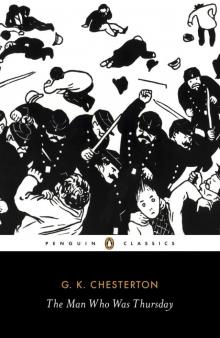 The Man Who Was Thursday: A Nightmare
The Man Who Was Thursday: A Nightmare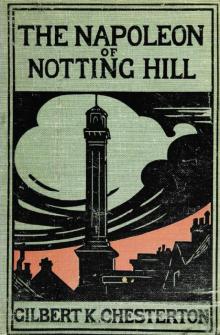 The Napoleon of Notting Hill
The Napoleon of Notting Hill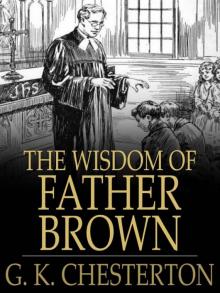 The Wisdom of Father Brown
The Wisdom of Father Brown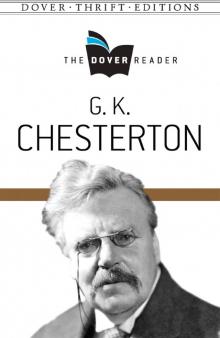 G K Chesterton- The Dover Reader
G K Chesterton- The Dover Reader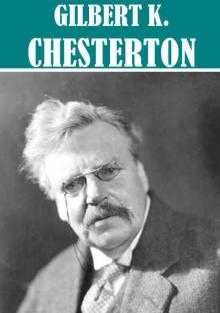 The Essential G. K. Chesterton
The Essential G. K. Chesterton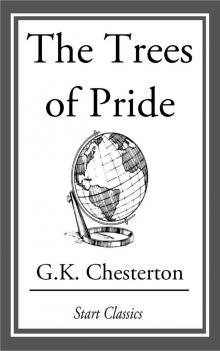 The Trees of Pride
The Trees of Pride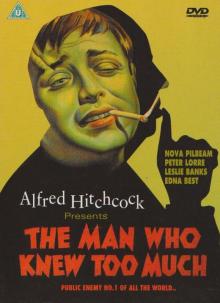 The Man Who Knew Too Much
The Man Who Knew Too Much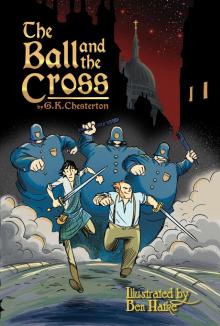 The Ball and the Cross
The Ball and the Cross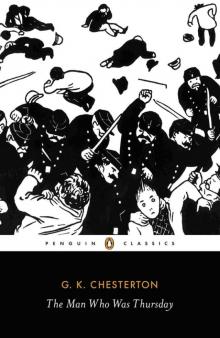 The Man Who Was Thursday (Penguin ed)
The Man Who Was Thursday (Penguin ed)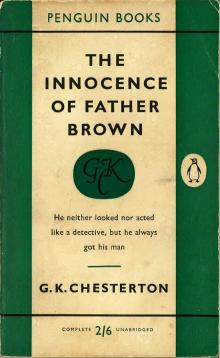 The Innocence of Father Brown
The Innocence of Father Brown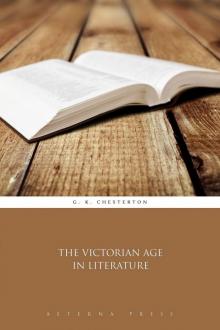 The Victorian Age in Literature
The Victorian Age in Literature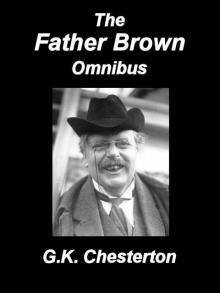 Father Brown Omnibus
Father Brown Omnibus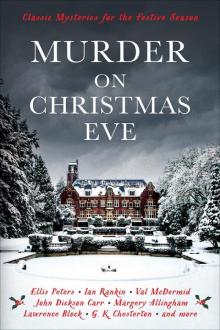 Murder On Christmas Eve
Murder On Christmas Eve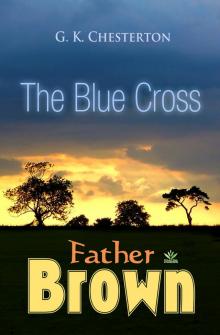 The Blue Cross
The Blue Cross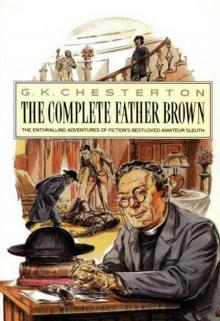 The Complete Father Brown Mysteries Collection
The Complete Father Brown Mysteries Collection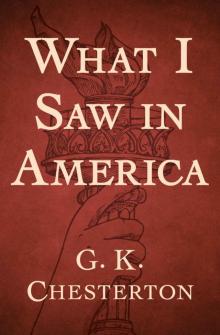 What I Saw in America
What I Saw in America